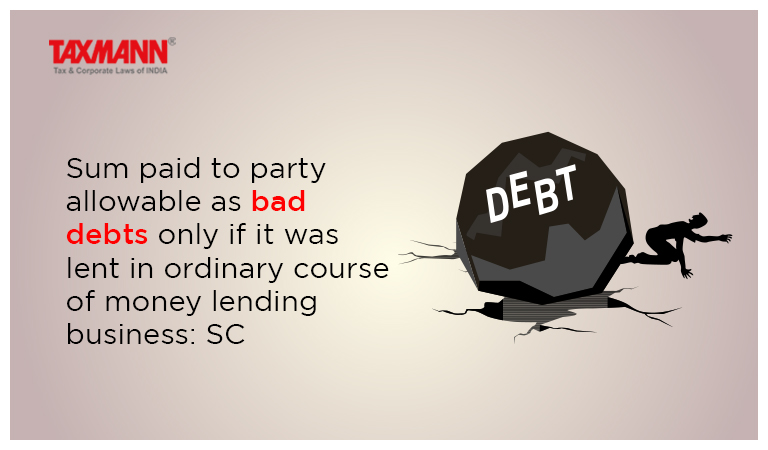Sum paid to party allowable as bad debts only if it was lent in ordinary course of money lending business: SC
- Blog|News|Income Tax|
- 2 Min Read
- By Taxmann
- |
- Last Updated on 27 August, 2022

Case Details: PCIT v. Khyati Realtors (P.) Ltd. - [2022] 141 taxmann.com 461 (SC)
Judiciary and Counsel Details
-
- Uday Umesh Lalit, S. Ravindra Bhat & Sudhanshu Dhulia, JJ.
Facts of the Case
The assessee carries on real estate development business, trading in transferable development rights (TDR) and finance. During scrutiny assessment, the Assessing Officer (AO) disallowed sum of Rs. 10 crores claimed as a bad debt. CIT(A) confirmed the disallowance. However, the Tribunal allowed assessee’s plea.
Later, the Bombay High Court ruled that no question of law requiring a decision arose in the appeal and consequently declined to entertain AO’s plea. AO approached the Supreme Court of India.
Supreme Court Held
The Supreme Court held that for the purposes of computing income chargeable to tax, besides specific deductions, ‘other deductions’ enumerated in different clauses of Section 36 can be allowed by the AO.
Each of the deductions must relate to the business carried out by the assessee. If the assessee carries on a business and writes off a debt relating to the business as irrecoverable, it would, without doubt, be entitled to a corresponding deduction under Section 36(1)(vii) subject to the fulfillment of the conditions set forth in Section 36(2).
Further, merely stating a bad and doubtful debt as an irrecoverable write-off without the appropriate treatment in the accounts, as well as non-compliance with the conditions in Section 36(1)(vii), 36(2), and Explanation to Section 36(1)(vii) would not entitle the assessee to claim a deduction.
In the present case, the record shows that the accounts of the assessee nowhere showed that the advance was made by it in the ordinary course of business.
In support of its argument that the amount was given as a loan, the assessee nowhere established the duration of the advance, the terms, and conditions applicable to it, interest payable, etc. Though the assessee conceded that it had received interest income, it could not establish that any interest was paid (or shown to be payable in its accounts) for the sum of Rs. 10 crores.
Further, there was nothing on record to suggest that the requirement of the law that the bad debt was written-off as irrecoverable in the assessee’s accounts for the previous year had been satisfied.
Thus, assessee’s claim for deduction of Rs. 10 crores as a bad and doubtful debt could not be allowed. The findings of the ITAT and the High Court were insubstantial and to be set aside.
Disclaimer: The content/information published on the website is only for general information of the user and shall not be construed as legal advice. While the Taxmann has exercised reasonable efforts to ensure the veracity of information/content published, Taxmann shall be under no liability in any manner whatsoever for incorrect information, if any.

Taxmann Publications has a dedicated in-house Research & Editorial Team. This team consists of a team of Chartered Accountants, Company Secretaries, and Lawyers. This team works under the guidance and supervision of editor-in-chief Mr Rakesh Bhargava.
The Research and Editorial Team is responsible for developing reliable and accurate content for the readers. The team follows the six-sigma approach to achieve the benchmark of zero error in its publications and research platforms. The team ensures that the following publication guidelines are thoroughly followed while developing the content:
- The statutory material is obtained only from the authorized and reliable sources
- All the latest developments in the judicial and legislative fields are covered
- Prepare the analytical write-ups on current, controversial, and important issues to help the readers to understand the concept and its implications
- Every content published by Taxmann is complete, accurate and lucid
- All evidence-based statements are supported with proper reference to Section, Circular No., Notification No. or citations
- The golden rules of grammar, style and consistency are thoroughly followed
- Font and size that’s easy to read and remain consistent across all imprint and digital publications are applied



 CA | CS | CMA
CA | CS | CMA
